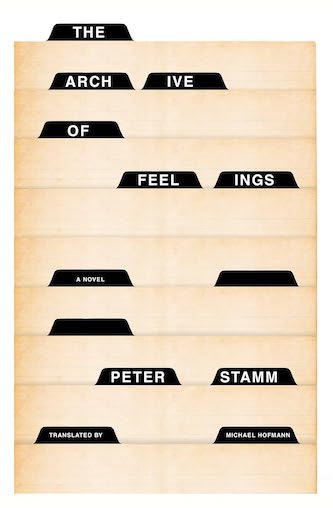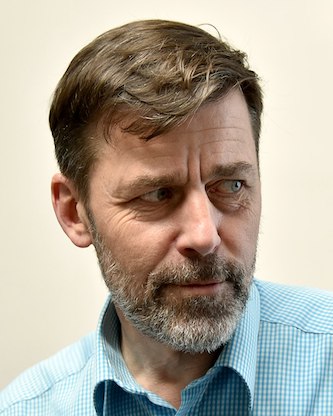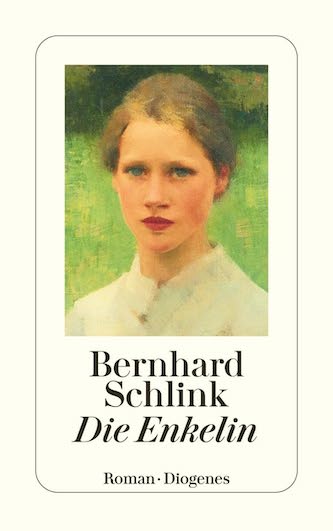Book Reviews: Peter Stamm’s “The Archive of Feelings” and Bernhard Schlink’s “The Grandaughter”
By Kai Maristed
One wonders sometimes whether the weight of acclaim doesn’t place an author beyond critical reproach. The bandwagon effect.
The Archive of Feelings by Peter Stamm. Translated from the German by Michael Hoffmann (Other Press, 192 pages)
Die Enkelin (The Granddaughter) by Bernhard Schlink. (Diogenes Verlag, Switzerland, 368 pages, 2021).
 Here’s a recent parallel setup, in novels originally published the same year, by two very different writers. In both, a solitary first-person narrator, one German-Swiss, the other a Berliner, flees the hurly-burly of the outside world for the safe monotony of his home. The Covid Zeitgeist at work?
Here’s a recent parallel setup, in novels originally published the same year, by two very different writers. In both, a solitary first-person narrator, one German-Swiss, the other a Berliner, flees the hurly-burly of the outside world for the safe monotony of his home. The Covid Zeitgeist at work?
In the first book, Peter Stamm’s The Archive of Feelings, a retired archivist gradually isolates himself, due to native inclination and his job’s obsolescence. In the second, Bernhard Schlink’s Die Enkelin, (The Granddaughter), a Berlin bookstore owner grows numb and indifferent after finding his beloved wife dead in the bathtub. Both men appear old (pardon the word) as their stories open. They venture forth only for daily walks. Rest on benches. Can’t cook. Are visited, tortured, consoled by memories of the one true love, or, in the Swiss man’s case, her hallucinated presence. But further on we learn that while the bereaved German is 71, the Swiss fellow is only in his 40s: awfully young to stay buried in one’s basement cataloguing and re-cataloguing piles of yellowing print clippings that go back decades, articles he bought from his ex-employer for a song. Everything under the sun becomes grist for his compilations. “Sounds of water — I should start a file on them though I wonder where it would go in my system. Under Nature, Physics, or even Music?”
Ambiguity is the name of The Archive’s game. Subtle tense switches in the slow-moving first two paragraphs herald wilder confusion to come. The unnamed narrator’s life-force has been sapped by his passion for Franziska, a girl he last saw for sure when they were both 14. Then, she was an adored soulmate-classmate; he was too shy to bare his heart. She went on to have a starry career as the pop singer Fabienne. Over the years, our archivist narrator follows (stalks?) her from afar through press releases. Clearly an act of extreme devotion, if not OCD. They may or may not have met a few times long ago, but faint heart always prevailed, letting opportunity slip away. When, toward this short book’s end, Franziska apparently invites him to a late-life one-night stand, are we to take the physical consummation as fact? Does he? Are we witnessing the bloom of psychosis, or love’s labors rewarded? This question lies at the heart of The Archive of Feelings. I vote for psychosis, although not because the author studied psychology for a few semesters. In fact, given that, one might have expected more clinical nuance.

Writer Peter Stamm. Photo: Wiki Common
Peter Stamm has published dozens of novels and plays. His stack of awards includes a Booker shortlisting. Critics labeled his early books as realism in the vein of Albert Camus, but there’s not much hard realism in this static portrayal of romantic wish-fulfillment.
One wonders sometimes whether the weight of acclaim doesn’t place an author beyond critical reproach. The bandwagon effect. I’ve enjoyed and reviewed earlier books by Stamm, but this one, praised as “his best yet,” did not intrigue or even convince me. What was Fabienne’s motive for keeping the nebbish hanging? (Assuming it happened.) As for our narrator, his lifetime of extreme passivity taxes credulity. To love, after all, is an action.
A note on the translation. Michael Hoffmann comes close to being German-English translator royalty. But after reading The Archive in both languages I was surprised to discover a number of unnecessary changes of meaning, an especially regrettable instance in the final sentence. Franziska suggests they gaze together at mountain peaks: to look “forward,” or “into the distance” (my translations of ‘in die Ferne’), becomes “look…back there.”

Our second old man, in Bernhard Schlink’s Die Enkelin, is Kaspar. Also childless, but utterly content as bookstore owner and husband to Birgit, despite her alcohol dependency and periodic remote moods — until he finds her dead by some combination of pills, booze, and bath water. Clearly accidental, the police decide. And Kaspar agrees, until he manages to crack the password on her computer and begins, however guiltily, to read the notes toward a novel that she has been secretly working on, in a little attic room, for 10 years. As he reads, the paralysis of loss gives way to shock, a sense of betrayal, anger. Was this the woman with whom, in the brief thaw of May 1964, he fell in love during a student East meets West encounter trip to the GDR side of the Berlin Wall? Whom he, until then hardly a risk-taker, helped after months of separation to escape to the West through Prague and Vienna? Love is not a passive verb!
These passages are so packed with detail, the idealism and doctrines, high spirits, and cold war angst of that era, that it’s hard not to suspect Schlink of drawing from firsthand memory.
Die Enkelin next morphs into a book-within-a-book: the full text of Birgit’s notes, or, more accurately, Confessions. For one reason or another, she concealed throughout their life together the fact that she was pregnant when they met, by an up-and-coming GDR official who led her on until it was too late for an abortion. He offered to adopt the baby for himself and his sterile wife. But bitter Birgit would see him (and her baby too?) in hell first. She abandoned the newborn with her best friend, to be placed in an orphanage, and ran away to freedom. Aka lucky Kaspar. Who now, on reading her posthumous notes, is spared nothing.
Part two of the novel follows him as he tracks down the daughter, now married and living in a voelkische community — neo-nationalist, white supremacist, back to the land — under the fist of her husband, Leo, and with Sigrun, their bright in every way 14-year-old daughter who dresses in dirndl for festivals and works alongside her farmhand father. By announcing that Birgit has left a will (false), Kaspar essentially trades periodic payments to the suspicious but greedy Leo — he is saving to buy his own farm –for periodic week-long visits from Sigrun. She helps out in his bookstore and cooks well; they go to concerts; afterward she plays the piano left by Birgit, and he discovers that the granddaughter has extraordinary musical talent.
Kaspar arranges lessons. He has found a new reason for living, but hardly in peace. They tangle over Anne Frank (fake documents, according to Sigrun) Muslims (taking over Germany), Jews (the Holocaust never happened, and Sigrun’s female idol was a compassionate overseer in Ravensbrueck, which was a prison for hardened criminals.) And so on. In short, her Weltbild is not his. Despite constant self-questioning and self-criticism, Kaspar finds himself in an escalating war for Sigrun’s cultural-political-historical soul. His weapons are music, judiciously chosen books, and not least the kitten in the bookstore. But can this possibly end well? Not if the voelkische parents can help it, and they’ve nourished Sigrun on their Aryan/Hakenkreuz-decorated/hate-filled belief system all her life. It is an impregnable system, barricaded with reality-defying arguments on one hand and a refusal to debate on the other. It offers children discipline and real responsibility and the joys of campfires and forest survival lore and torch-lit celebrations. It has a certain nutty hermetic logic, much like MAGA cults here in the US.

Writer Bernard Schlink. Photo: Facebook
Bernhard Schlink has also published many novels. He exploded into the anglophone reading world with his early bestseller-turned-hit-movie, The Reader. Decades later, appropriately and wonderfully, Die Enkelin, (Diogenes Verlag 2021) is more mature, thematically and structurally, than his early deserved success. It is not a perfect book. Schlink’s plotting, like Stamm’s, sometimes takes a twist beyond the credible. Also, some readers from the former GDR have criticized the book’s bourgeois assumption of Western moral superiority, pointing out the historical “jam” the GDR was in, between the capitalist West and anything but democratic USSR. Fair point. That said, Die Enkelin delves with sympathy into Birgit’s and, two generations later, Sigrun’s aching experience of homelessness, of being stranded between two cultures, two ideologies. Between past and present. Themes central to other contemporary German authors, notably Jenny Erpenbeck, and filmmakers, as in Goodbye, Lenin. (Full disclosure: also explored in my own Berlin novel, Broken Ground.)
It’s regrettable that Die Enkelin hasn’t yet, apparently, been scheduled for an English edition. Those living outside present-day Germany would benefit the most from Kaspar’s hard-won enlightenment about what motivates the burgeoning voelkische movement. As a slightly older Sigrun discovers, this Nazi-flavored belief system is no longer limited to the former GDR states. Recently the AfD, Alternatif für Deutschland — the right-radical, voelkisch permeated political party — is polling higher than each of the three parties now governing Germany. Gute Nacht, liebe Welt.
Kai Maristed studied political philosophy in Germany, and now lives in Paris and Massachusetts. She has reviewed for the Los Angeles Times, New York Times, and other papers. Her books include the short story collection Belong to Me, and Broken Ground, set in Berlin. Recent work includes “Evangeline, or Theories of Childhood Development,” in the Iowa Review, “The Age of Migration,” in Ploughshares, and a forthcoming essay in Agni. Read Kai’s Paris-centric take on politics and the arts here.
Tagged: Bernhard Schlink, Die Enkelin, Germany, Nazi, Peter Stamm, right wing, The Archive of Feelings, The Granddaughter
